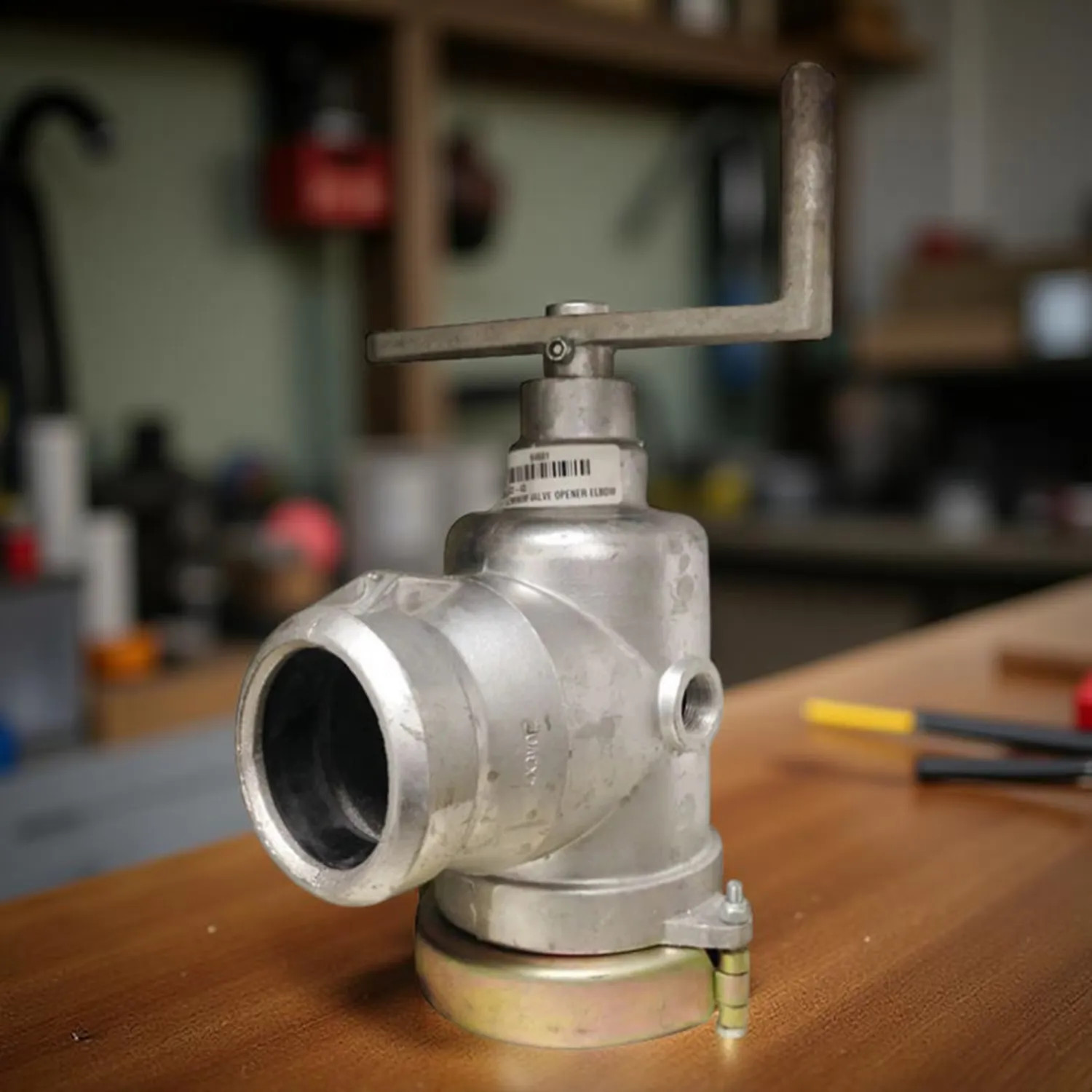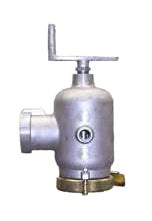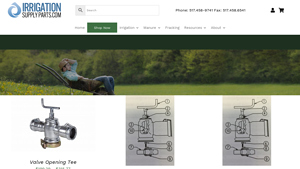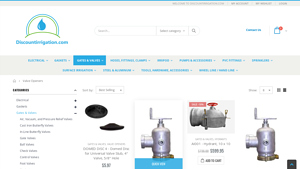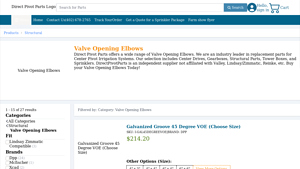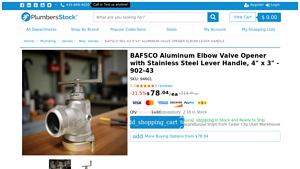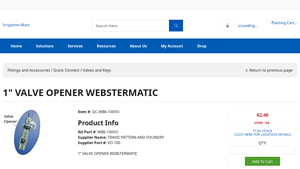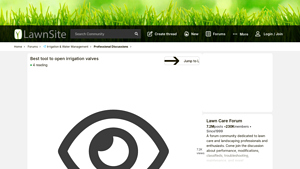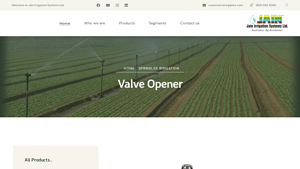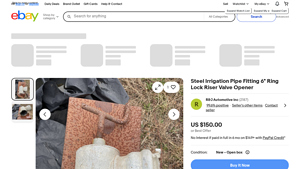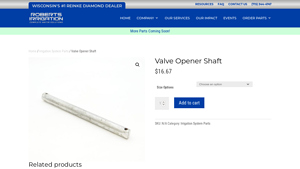Introduction: Navigating the Global Market for irrigation valve opener
In today’s rapidly evolving agricultural landscape, sourcing the right irrigation valve opener is crucial for optimizing water management systems. With increasing demands for efficient irrigation practices, international B2B buyers face the challenge of selecting the most suitable valve openers that meet their unique agricultural needs. This comprehensive guide serves as a vital resource, covering various types of irrigation valve openers, their applications, and essential criteria for supplier vetting.
From understanding the nuances of valve opening elbows to exploring the cost implications of different materials and designs, this guide empowers decision-makers across Africa, South America, the Middle East, and Europe—particularly in regions like Saudi Arabia and Vietnam. It offers insights into the technical specifications and compatibility of products, ensuring buyers can confidently navigate the complexities of the global market.
By equipping you with the knowledge to assess product performance, durability, and overall value, this guide facilitates informed purchasing decisions that enhance operational efficiency and sustainability. Whether you are upgrading existing systems or investing in new technologies, understanding the intricacies of irrigation valve openers is essential for achieving optimal agricultural productivity in diverse environments.
Understanding irrigation valve opener Types and Variations
| Type Name | Key Distinguishing Features | Primary B2B Applications | Brief Pros & Cons for Buyers |
|---|---|---|---|
| Valve Opening Elbows | 45-degree and 90-degree angles; various sizes; often galvanized | Center pivot irrigation systems | Pros: Durable materials; versatile sizing options. Cons: May require specific fittings for compatibility. |
| Ring Lock Valve Openers | Designed for quick engagement and disengagement; robust locking mechanism | Agricultural irrigation systems | Pros: Fast operation; reliable under pressure. Cons: Higher initial cost; may need specialized training for use. |
| Universal Valve Openers | Compatible with multiple valve types; adjustable sizes | Diverse irrigation setups | Pros: Flexibility across systems; reduces inventory needs. Cons: Potential for reduced efficiency in some applications. |
| Riser Valve Stubs | Connects to various irrigation systems; available in male/female threads | Mainline to lateral connections | Pros: Easy installation; ensures a secure connection. Cons: Limited to specific thread types; may not suit all systems. |
| VOE Handles and Accessories | Ergonomic designs; various materials; compatible with multiple valve types | Maintenance and replacement parts | Pros: Improves user handling; easy to replace. Cons: May wear out faster in high-use environments. |
What are the Characteristics of Valve Opening Elbows?
Valve opening elbows are crucial components in irrigation systems, particularly in center pivot setups. Available in various angles (typically 45 and 90 degrees), these elbows are designed to facilitate smooth water flow while connecting different sections of the irrigation system. Their construction often features galvanized steel, which enhances durability against corrosion. When purchasing, buyers should consider compatibility with existing systems, as well as the specific sizes required for their applications.
How Do Ring Lock Valve Openers Enhance Efficiency?
Ring lock valve openers are engineered for quick and secure engagement, making them ideal for agricultural irrigation systems. Their robust locking mechanism ensures that they remain securely in place under varying pressure conditions. This type of opener is particularly beneficial for operations that require frequent adjustments, as it minimizes downtime. Buyers should weigh the initial investment against the potential efficiency gains, particularly in large-scale operations.
Why Choose Universal Valve Openers for Diverse Applications?
Universal valve openers are designed to be compatible with multiple valve types, making them a flexible choice for various irrigation setups. Their adjustable sizing allows for easy adaptation across different systems, which can significantly reduce the need for maintaining a large inventory of specific parts. However, buyers should consider the potential trade-off in efficiency, as these openers may not perform optimally in all scenarios.
What Role Do Riser Valve Stubs Play in Irrigation Systems?
Riser valve stubs are integral in connecting mainlines to lateral irrigation systems. They come in both male and female thread configurations, allowing for versatile installation options. Their straightforward installation process makes them a popular choice among irrigation professionals. When purchasing, it is essential to ensure compatibility with existing threads and fittings to avoid leaks and ensure efficient water delivery.
How Do VOE Handles and Accessories Improve User Experience?
VOE handles and accessories are designed to enhance the usability of valve openers. Their ergonomic designs ensure that operators can easily manipulate valves, reducing the risk of strain during operation. These handles are compatible with a variety of valve types, making them a practical addition to any irrigation toolkit. Buyers should consider the frequency of use and potential wear when selecting these components, as they may require more frequent replacement in high-traffic environments.
Key Industrial Applications of irrigation valve opener
| Industry/Sector | Specific Application of irrigation valve opener | Value/Benefit for the Business | Key Sourcing Considerations for this Application |
|---|---|---|---|
| Agriculture | Managing water flow in large-scale irrigation systems | Enhances crop yield through efficient water management | Durability, compatibility with existing systems, cost |
| Landscaping & Horticulture | Controlling water supply for commercial landscaping projects | Reduces water wastage, promotes healthy plant growth | Size variations, ease of installation, maintenance support |
| Municipal Water Management | Regulating water distribution in urban irrigation networks | Improves water conservation and distribution efficiency | Compliance with local regulations, robust construction |
| Industrial Manufacturing | Supporting cooling systems that require precise water control | Ensures consistent operation and reduces downtime | Pressure ratings, material compatibility, sourcing speed |
| Mining & Mineral Extraction | Water management in mineral processing and dust suppression | Enhances operational efficiency and environmental compliance | Resistance to corrosive materials, size adaptability |
How is an irrigation valve opener used in agriculture and what problems does it solve?
In agriculture, irrigation valve openers are essential for managing water flow in large-scale irrigation systems. They allow farmers to control water distribution effectively, ensuring that crops receive the right amount of water. This precision helps solve problems related to water wastage and uneven irrigation, which can lead to poor crop yields. Buyers in this sector should consider the durability and compatibility of valve openers with existing irrigation systems, as well as the cost-effectiveness of the solution.
What role does irrigation valve opener play in landscaping and horticulture?
In landscaping and horticulture, irrigation valve openers are used to control water supply for commercial projects, such as parks and gardens. By regulating water flow, these devices help reduce water wastage and promote healthy plant growth. This is particularly important in regions facing water scarcity. Buyers should focus on size variations and ease of installation, as well as maintenance support, to ensure the longevity of the systems in outdoor environments.
How does irrigation valve opener enhance municipal water management?
Municipal water management relies on irrigation valve openers to regulate water distribution in urban irrigation networks. These devices improve water conservation and enhance distribution efficiency, which is crucial for sustainable urban development. For international buyers, especially in developing regions, compliance with local regulations and robust construction is vital to ensure long-term functionality and reliability in public infrastructure.
Why is irrigation valve opener important for industrial manufacturing?
In the industrial manufacturing sector, irrigation valve openers support cooling systems that require precise water control. This ensures consistent operation and minimizes downtime, which is essential for maintaining productivity. Key considerations for buyers include pressure ratings and material compatibility, as the systems must withstand various operational conditions. Fast sourcing speeds are also important to avoid delays in production.
How does irrigation valve opener support mining and mineral extraction operations?
In mining and mineral extraction, irrigation valve openers are critical for managing water in processing and dust suppression applications. Effective water management enhances operational efficiency and helps companies comply with environmental regulations. Buyers in this sector should prioritize resistance to corrosive materials and adaptability in size, as these factors significantly influence the performance and longevity of the equipment in harsh environments.
3 Common User Pain Points for ‘irrigation valve opener’ & Their Solutions
Scenario 1: Difficulty in Sourcing Compatible Parts for Valve Openers
The Problem: B2B buyers often encounter the challenge of sourcing irrigation valve openers that are compatible with existing systems. In regions like Africa and the Middle East, where irrigation infrastructure may be a mix of local and international brands, finding parts that fit specific requirements can be frustrating. Compatibility issues lead to increased downtime and additional costs, as mismatched components can result in operational failures or inefficient water management.
The Solution: To effectively source compatible irrigation valve openers, buyers should conduct thorough compatibility assessments before making purchases. This involves cataloging existing equipment and identifying the specifications of the valve openers currently in use. Engaging with suppliers who offer detailed product descriptions and compatibility charts can greatly simplify this process. Additionally, B2B buyers should consider forming partnerships with reliable suppliers that specialize in a wide range of brands. Establishing a robust network can facilitate access to parts that are often hard to find, ensuring that operations run smoothly without costly delays.
Scenario 2: High Maintenance Costs Due to Low-Quality Materials
The Problem: Another significant pain point for B2B buyers is the high maintenance costs associated with low-quality irrigation valve openers. In regions with extreme weather conditions, such as South America and the Middle East, subpar materials can lead to frequent breakdowns and replacements. This not only escalates operational expenses but also disrupts agricultural schedules, impacting productivity and profitability.
The Solution: Investing in high-quality, durable valve openers made from robust materials can significantly reduce maintenance costs over time. Buyers should prioritize suppliers known for their rigorous quality standards and who provide warranties on their products. Conducting a cost-benefit analysis before purchasing can help in identifying long-term savings associated with higher upfront costs. Additionally, implementing a regular maintenance schedule can extend the lifespan of the valve openers. Training staff on proper handling and maintenance procedures can further mitigate the risk of wear and tear, ensuring that the investment pays off in the long run.
Scenario 3: Inefficiencies in Water Management Practices
The Problem: Many B2B buyers face inefficiencies in their irrigation systems due to outdated valve opener technology. In regions like Europe and Africa, where water scarcity is a pressing concern, ineffective water management can lead to wastage and increased operational costs. Traditional systems may not provide the flexibility or control required to optimize water usage, leaving buyers frustrated and seeking better solutions.
The Solution: To address these inefficiencies, B2B buyers should consider upgrading to modern irrigation valve openers equipped with advanced features like remote operation and automation. These innovations allow for precise control over water distribution, minimizing waste and ensuring that crops receive the appropriate amount of water. Buyers should evaluate the latest technologies and consult with suppliers who offer integrated solutions tailored to their specific needs. Training staff to utilize these advanced systems effectively can also enhance overall efficiency, leading to sustainable water management practices that benefit both the environment and the bottom line.
Strategic Material Selection Guide for irrigation valve opener
What are the Key Materials Used for Irrigation Valve Openers?
When selecting materials for irrigation valve openers, it is crucial to consider their properties, advantages, and limitations. The right choice can significantly influence the performance and longevity of the equipment, especially in diverse environmental conditions across regions like Africa, South America, the Middle East, and Europe.
How Does Steel Perform in Irrigation Valve Openers?
Steel is one of the most commonly used materials for irrigation valve openers due to its strength and durability. It typically offers high tensile strength and can withstand significant pressure and temperature variations, making it suitable for various irrigation systems. However, steel is prone to corrosion, especially in humid or saline environments, which can lead to premature failure if not properly treated.
Pros: Steel is robust, cost-effective, and widely available. It can handle high pressures and is suitable for heavy-duty applications.
Cons: The need for protective coatings to prevent rust can increase manufacturing complexity and costs. Additionally, in corrosive environments, maintenance may be more frequent.
Impact on Application: Steel valve openers are ideal for freshwater applications but may require additional protective measures in coastal or saline conditions.
What Advantages Does Aluminum Offer for Valve Openers?
Aluminum is another popular choice for irrigation valve openers, particularly in regions where weight is a consideration. It is lightweight yet strong, providing good corrosion resistance without the need for extensive coatings. Aluminum can handle moderate pressure and temperature ratings, making it suitable for many irrigation systems.
Pros: Its lightweight nature allows for easier handling and installation. Aluminum also resists corrosion naturally, which can reduce maintenance costs.
Cons: While aluminum is resistant to corrosion, it may not be as strong as steel under extreme conditions. It can also be more expensive than steel, impacting overall project budgets.
Impact on Application: Aluminum valve openers are well-suited for applications in areas with high humidity or where weight restrictions are critical, such as in mountainous regions.
Why Choose Plastic for Irrigation Valve Openers?
Plastic materials, particularly high-density polyethylene (HDPE) and polyvinyl chloride (PVC), are increasingly used for irrigation valve openers due to their excellent corrosion resistance and low weight. They can handle a variety of chemicals and are not susceptible to rust, making them suitable for various irrigation applications.
Pros: Plastic valve openers are lightweight, resistant to corrosion, and typically less expensive than metal options. They also require minimal maintenance.
Cons: Plastic may not withstand high pressures or extreme temperatures as effectively as metal, which could limit their use in certain applications.
Impact on Application: Plastic valve openers are ideal for low-pressure irrigation systems and environments with aggressive chemicals, making them suitable for agricultural applications in many regions.
What is the Role of Brass in Valve Openers?
Brass is a favored material for irrigation valve openers due to its excellent corrosion resistance and durability. It can handle moderate pressure and temperature variations, making it suitable for various irrigation applications. Brass is particularly effective in environments where exposure to water and moisture is common.
Pros: Brass offers good strength and corrosion resistance, making it a reliable choice for long-term use. Its aesthetic appeal also makes it suitable for visible installations.
Cons: Brass can be more expensive than other materials, and its availability may be limited in certain regions. It may also not be suitable for very high-pressure applications.
Impact on Application: Brass valve openers are well-suited for residential and commercial irrigation systems, particularly in regions with moderate climate conditions.
Summary Table of Material Selection for Irrigation Valve Openers
| Material | Typical Use Case for irrigation valve opener | Key Advantage | Key Disadvantage/Limitation | Relative Cost (Low/Med/High) |
|---|---|---|---|---|
| Steel | Heavy-duty irrigation systems | High strength and durability | Prone to corrosion without treatment | Medium |
| Aluminum | Lightweight applications | Corrosion-resistant and lightweight | Less strong under extreme conditions | High |
| Plastic | Low-pressure irrigation systems | Lightweight and low maintenance | Limited pressure and temperature tolerance | Low |
| Brass | Residential/commercial systems | Good corrosion resistance and aesthetic appeal | Higher cost and limited availability | Medium |
This comprehensive analysis of materials provides international B2B buyers with critical insights for making informed decisions regarding irrigation valve openers, ensuring optimal performance and longevity in diverse applications.
In-depth Look: Manufacturing Processes and Quality Assurance for irrigation valve opener
What Are the Key Manufacturing Processes for Irrigation Valve Openers?
The manufacturing of irrigation valve openers involves several critical stages, each contributing to the overall quality and functionality of the final product. Understanding these processes can help B2B buyers evaluate suppliers effectively.
How Are Materials Prepared for Manufacturing Irrigation Valve Openers?
The first stage in the manufacturing process involves material preparation, which typically includes selecting high-quality metals such as stainless steel, aluminum, or galvanized steel. These materials are chosen for their durability and resistance to corrosion, essential for outdoor applications in varied climates.
The raw materials undergo cutting, shearing, or laser cutting to create precise shapes and sizes needed for the components. Advanced techniques like water jet cutting may also be employed for intricate designs. Buyers should inquire about the material specifications, including certification and origin, as this can impact performance and longevity.
What Forming Techniques Are Used in the Production of Valve Openers?
Once the materials are prepared, the next step is forming. This stage may involve several methods, including:
- Stamping: Used for producing flat parts, where sheets of metal are punched to create specific shapes.
- Forging: This process involves shaping the metal using compressive forces, enhancing its strength and durability.
- Casting: Metal is poured into molds to create complex shapes that would be challenging to achieve through other methods.
Each technique has its advantages, and the choice often depends on the design complexity and production volume. Buyers should ask suppliers about the forming techniques used and their impact on the final product quality.
How Are Irrigation Valve Openers Assembled?
Assembly is a crucial phase where various components, such as handles, yokes, and seals, are brought together to create the complete valve opener. This process often involves:
- Manual Assembly: Skilled workers ensure that components fit correctly, providing quality checks at each step.
- Automated Assembly: In high-volume production, automation can enhance efficiency and consistency.
Quality assurance during assembly is vital, as any misalignment can lead to operational failures. Buyers should consider the assembly techniques used and how they influence product reliability.
What Finishing Processes Are Important for Irrigation Valve Openers?
The final stage in manufacturing involves finishing processes that enhance the product’s appearance and performance. Common finishing techniques include:
- Coating: Protective coatings, such as powder coating or galvanization, are applied to prevent corrosion and wear.
- Polishing: This improves the aesthetic appeal and reduces friction in moving parts.
- Inspection: A thorough inspection ensures that the finish meets specified standards.
Buyers should request information on finishing processes, as they play a critical role in the longevity and performance of irrigation valve openers.
How Is Quality Assurance Conducted in the Manufacturing of Valve Openers?
Quality assurance (QA) is an integral part of the manufacturing process, ensuring that the products meet international standards and customer expectations. A robust QA system can significantly reduce defects and enhance customer satisfaction.
What International Standards Should B2B Buyers Consider?
For irrigation valve openers, relevant international standards include:
- ISO 9001: This quality management standard ensures that organizations consistently provide products that meet customer and regulatory requirements.
- CE Marking: Required in Europe, this certification indicates conformity with health, safety, and environmental protection standards.
- API Standards: For valve openers used in oil and gas applications, the American Petroleum Institute (API) sets specific quality and performance standards.
Understanding these standards can help buyers assess the reliability of potential suppliers.
What Are the Key QC Checkpoints in Manufacturing?
Quality control (QC) involves several checkpoints throughout the manufacturing process, including:
- Incoming Quality Control (IQC): Inspection of raw materials upon arrival to ensure they meet specifications.
- In-Process Quality Control (IPQC): Ongoing inspections during production to catch defects early.
- Final Quality Control (FQC): A comprehensive review of the finished product before shipment.
Each checkpoint serves to identify and rectify potential issues, ensuring only high-quality products reach the market.
What Common Testing Methods Are Used for Irrigation Valve Openers?
Testing methods play a critical role in validating product quality. Common techniques include:
- Pressure Testing: Ensures that valve openers can withstand operational pressures without leaking.
- Functional Testing: Simulates real-world conditions to verify that the product operates as intended.
- Durability Testing: Assesses the lifespan of the valve opener under various environmental conditions.
Buyers should inquire about the testing protocols used by suppliers to ensure reliability and performance.
How Can B2B Buyers Verify Supplier Quality Control?
B2B buyers should take proactive steps to verify the quality control processes of potential suppliers. Here are some strategies:
- Audits: Conduct on-site audits to review manufacturing processes and QC practices. This provides firsthand insight into the supplier’s capabilities.
- Quality Reports: Request documentation that details quality metrics, including defect rates and customer feedback.
- Third-Party Inspections: Engage independent inspectors to evaluate the supplier’s operations and product quality.
These measures can help ensure that suppliers adhere to the promised quality standards, particularly for buyers from diverse regions like Africa, South America, the Middle East, and Europe.
What Nuances Should International Buyers Be Aware Of Regarding QC and Certification?
International buyers must navigate various nuances when dealing with quality control and certification. Key considerations include:
- Local Regulations: Different regions may have specific regulations governing product safety and quality. Buyers should ensure that suppliers comply with these local standards.
- Cultural Differences: Understanding cultural expectations regarding quality and service can enhance communication and collaboration with suppliers.
- Logistics and Supply Chain: International shipping can affect product integrity. Buyers should discuss packaging and handling procedures to mitigate risks.
By being informed and proactive, international B2B buyers can establish strong partnerships with suppliers, ensuring the procurement of high-quality irrigation valve openers tailored to their specific needs.
Practical Sourcing Guide: A Step-by-Step Checklist for ‘irrigation valve opener’
In today’s competitive agricultural landscape, sourcing the right irrigation valve opener is critical for enhancing efficiency and ensuring sustainable water management. This guide provides a structured approach for B2B buyers looking to procure these essential components, particularly in diverse markets such as Africa, South America, the Middle East, and Europe.
Step 1: Define Your Technical Specifications
Identifying the precise technical requirements for your irrigation valve opener is the first step in the sourcing process. Consider factors such as size, material (e.g., galvanized steel vs. aluminum), and compatibility with existing systems. Clearly defined specifications help streamline the selection process and ensure that the products meet operational needs.
Step 2: Research Reliable Suppliers
Conduct thorough research to identify suppliers with a strong reputation in the irrigation sector. Look for companies that specialize in irrigation products and have a history of serving your target region. Utilize industry directories, trade shows, and online marketplaces to compile a list of potential vendors.
Step 3: Evaluate Potential Suppliers
Before making a commitment, it’s crucial to vet suppliers thoroughly. Request company profiles, case studies, and references from buyers in a similar industry or region. Assess the supplier’s experience with the specific types of valve openers you need, including their production capabilities and quality control measures.
- Check for Certifications: Ensure that suppliers hold relevant industry certifications, which can indicate adherence to quality standards and regulatory compliance.
- Review Customer Feedback: Investigate customer reviews and testimonials to gauge satisfaction levels and reliability.
Step 4: Compare Pricing and Payment Terms
Once you have shortlisted suppliers, compare their pricing structures and payment terms. Be aware that the lowest price does not always equate to the best value; consider the total cost of ownership, which includes shipping, taxes, and potential import duties.
- Request Detailed Quotations: Ensure that you receive detailed quotes that break down costs, including any additional fees.
- Negotiate Terms: Engage in discussions with suppliers about payment options, including discounts for bulk purchases or favorable credit terms.
Step 5: Assess Delivery Capabilities
Understanding a supplier’s delivery capabilities is essential to ensure timely access to your irrigation valve openers. Discuss lead times and shipping options, particularly if you are sourcing from international suppliers.
- Inquire About Logistics: Check if the supplier has established relationships with reliable shipping partners and whether they can manage customs clearance efficiently.
- Confirm Tracking Options: Ensure that the supplier provides tracking capabilities for shipments, allowing you to monitor the progress of your order.
Step 6: Request Samples for Testing
Before finalizing a large order, request samples of the irrigation valve openers for testing. This step allows you to evaluate the quality and compatibility of the products with your existing systems.
- Conduct Performance Tests: Test the samples under actual operating conditions to assess durability and functionality.
- Gather Feedback from Users: Involve your team in the testing process to gather insights on usability and effectiveness.
Step 7: Finalize Your Purchase Agreement
Once you are satisfied with the supplier and product quality, finalize the purchase agreement. Ensure that the terms include warranties, return policies, and after-sales support to safeguard your investment.
- Document Everything: Keep a record of all communications, agreements, and transaction details for future reference.
- Plan for Future Needs: Consider establishing a long-term relationship with the supplier for future orders, which can lead to better pricing and service.
By following this structured checklist, B2B buyers can effectively navigate the procurement process for irrigation valve openers, ensuring they make informed decisions that align with their operational goals.
Comprehensive Cost and Pricing Analysis for irrigation valve opener Sourcing
When sourcing irrigation valve openers, understanding the comprehensive cost structure and pricing dynamics is crucial for international B2B buyers. This analysis delves into the various cost components, price influencers, and strategic buyer tips tailored for markets in Africa, South America, the Middle East, and Europe.
What Are the Key Cost Components for Irrigation Valve Openers?
The cost of irrigation valve openers is influenced by several core components:
Materials: The primary materials used—such as steel, aluminum, and rubber—directly affect pricing. For example, galvanized steel options may have a higher upfront cost but offer greater durability and corrosion resistance, potentially leading to lower maintenance costs over time.
Labor: Labor costs vary significantly by region. In countries with higher wage standards, the cost of manufacturing may increase, impacting the final pricing of the product.
Manufacturing Overhead: This includes costs related to factory operation, utilities, and equipment maintenance. Efficient manufacturing processes can help keep these costs low.
Tooling: Custom tooling for specific designs or sizes can increase initial costs. However, it may be amortized over larger production runs, making it cost-effective for bulk orders.
Quality Control (QC): Rigorous quality control processes ensure product reliability and compliance with international standards. This might add to the cost but is essential for preventing costly failures in the field.
Logistics: Shipping costs can vary based on distance, mode of transportation, and Incoterms. Effective logistics planning can optimize these costs.
Margin: Supplier margins can fluctuate based on market conditions, competition, and demand. Understanding these margins can provide insight into pricing flexibility during negotiations.
How Do Price Influencers Impact the Cost of Irrigation Valve Openers?
Several factors influence the pricing of irrigation valve openers:
Volume/MOQ (Minimum Order Quantity): Higher order volumes typically lead to reduced per-unit costs. Suppliers often provide discounts for bulk purchases, making it advantageous for buyers to consolidate orders.
Specifications and Customization: Custom-designed products will incur additional costs due to tooling and specialized materials. Buyers should evaluate whether the benefits of customization outweigh these costs.
Materials and Quality Certifications: Products that meet specific quality standards or certifications may command higher prices. Buyers should assess the value of these certifications against potential risks of lower-quality alternatives.
Supplier Factors: The reputation and reliability of the supplier can affect pricing. Established suppliers may offer premium pricing due to their track record of quality and service.
Incoterms: The choice of Incoterms can impact overall costs, as they dictate who is responsible for shipping, insurance, and tariffs. Understanding these terms can help buyers negotiate better shipping conditions and costs.
What Are Some Strategic Tips for Buyers in International Markets?
Negotiate Wisely: Leverage your knowledge of cost components and price influencers during negotiations. This can help secure more favorable terms and pricing.
Focus on Total Cost of Ownership (TCO): Rather than solely considering the purchase price, evaluate the TCO, which includes maintenance, operational efficiency, and potential downtime costs. This holistic view can lead to better long-term investment decisions.
Consider Regional Variations: Buyers from Africa, South America, the Middle East, and Europe should be aware of regional price variations due to local economic conditions, tariffs, and shipping costs. Tailoring sourcing strategies to local market conditions can yield significant savings.
Explore Alternative Suppliers: Don’t limit yourself to a single supplier. Exploring multiple options can reveal competitive pricing and unique product features that may better meet your needs.
Stay Informed on Market Trends: Keeping abreast of industry trends, material costs, and technological advancements can provide leverage in negotiations and help anticipate future pricing shifts.
Disclaimer on Indicative Prices
Prices for irrigation valve openers can vary widely based on specifications, supplier, and market conditions. The pricing examples referenced in this analysis are indicative and should be verified with suppliers for accurate quotations tailored to specific requirements.
Alternatives Analysis: Comparing irrigation valve opener With Other Solutions
Exploring Alternatives to Irrigation Valve Openers: Key Comparisons
In the context of agricultural irrigation systems, the selection of the right valve mechanism is crucial for efficiency and effectiveness. While irrigation valve openers are a popular choice, there are several alternative solutions that may better suit specific operational needs or budget constraints. This analysis compares irrigation valve openers with two viable alternatives: Electric Actuators and Manual Gate Valves.
Comparison Table
| Comparison Aspect | Irrigation Valve Opener | Electric Actuator | Manual Gate Valve |
|---|---|---|---|
| Performance | High; allows for quick and efficient valve operation | Very high; provides precise control and automation | Moderate; requires manual effort, slower response |
| Cost | Moderate ($200-$500) | High ($500-$2,000) | Low ($50-$300) |
| Ease of Implementation | Easy; straightforward installation | Moderate; may require professional installation | Easy; simple to install and operate |
| Maintenance | Low; occasional checks required | Moderate; requires regular maintenance and checks | Low; minimal upkeep needed |
| Best Use Case | Large-scale agricultural operations needing fast valve control | Automated systems needing precise control and integration | Smaller operations or less frequent use where manual operation is acceptable |
Detailed Breakdown of Alternatives
1. Electric Actuators
Electric actuators are devices that automate the opening and closing of irrigation valves using electric power. They offer precise control over the valve position and can be integrated into automated irrigation systems.
Pros:
– Automation: Electric actuators allow for remote operation and scheduling, which can enhance efficiency and reduce labor costs.
– Precision: They provide accurate control over water flow, which can lead to better irrigation management and crop yield.
Cons:
– Higher Initial Cost: The upfront investment can be significant, particularly for larger systems, which may not be feasible for all operations.
– Complexity: Installation may require technical expertise, especially if integrating with existing systems, and they may need regular electrical maintenance.
2. Manual Gate Valves
Manual gate valves are traditional mechanical devices that require physical effort to open and close. They are widely used in various irrigation setups, particularly in smaller or less automated systems.
Pros:
– Affordability: They are generally less expensive than electric actuators or sophisticated valve openers, making them accessible for small-scale operations.
– Simplicity: Easy to install and operate without the need for electricity or complex controls.
Cons:
– Labor-Intensive: Manual operation can be time-consuming, especially in large fields where multiple valves need to be adjusted frequently.
– Inconsistent Performance: The performance can vary based on the operator’s skill and may not respond as quickly to changing irrigation needs as automated systems.
Conclusion: How to Choose the Right Solution for Your Irrigation Needs
When selecting between an irrigation valve opener and its alternatives, B2B buyers should consider their specific operational requirements, budget constraints, and long-term goals. For large-scale operations that demand efficiency and automation, investing in electric actuators may yield significant returns despite the higher upfront costs. Conversely, for smaller farms or operations with limited budgets, manual gate valves offer a cost-effective and straightforward solution. Ultimately, the choice should align with the operational scale, maintenance capabilities, and the desired level of automation in the irrigation system.
Essential Technical Properties and Trade Terminology for irrigation valve opener
What Are the Essential Technical Properties of an Irrigation Valve Opener?
When sourcing irrigation valve openers, understanding their technical properties is crucial for making informed purchasing decisions. Here are some key specifications to consider:
1. Material Grade
The material used for valve openers can significantly impact durability and performance. Common materials include galvanized steel, aluminum, and various plastics. Galvanized steel offers high strength and corrosion resistance, making it suitable for harsh environments. Aluminum is lightweight and resistant to rust, ideal for applications where weight is a concern. Selecting the appropriate material ensures that the valve opener will withstand the specific environmental conditions of its application, thus minimizing maintenance costs.
2. Size and Compatibility
Irrigation valve openers come in various sizes, typically measured in inches (e.g., 3″, 4″, 6″, and 8″). Compatibility with existing irrigation systems is essential; therefore, understanding the specifications of your current setup is critical. Sizing impacts the flow rate and efficiency of the irrigation system. Ensuring compatibility can prevent operational issues and ensure optimal performance.
3. Pressure Rating
Pressure ratings indicate the maximum pressure the valve opener can withstand, typically expressed in PSI (pounds per square inch). This specification is vital for preventing failures that could lead to leaks or system breakdowns. Buyers should ensure that the pressure rating aligns with the operational requirements of their irrigation system to ensure reliability and safety.
4. Tolerance and Precision
Tolerance refers to the allowable deviation from specified dimensions. High precision in manufacturing ensures that the valve opener fits correctly and operates efficiently within the system. Poorly manufactured components can lead to leaks or mechanical failures. Selecting products with tight tolerances is crucial for long-term reliability and performance.
5. Operating Temperature Range
Understanding the operating temperature range of valve openers is essential, especially in regions with extreme climates. Materials and design must withstand both high and low temperatures to prevent warping, cracking, or other failures. This specification is particularly important for international buyers in diverse climates, ensuring that their products will perform consistently.
Which Trade Terminology Should Buyers Be Aware Of?
Familiarizing yourself with industry-specific terminology can facilitate better communication and understanding when purchasing irrigation valve openers. Here are several key terms:
1. OEM (Original Equipment Manufacturer)
OEM refers to companies that produce parts that may be marketed by another manufacturer. In the irrigation sector, OEM products are often regarded as high-quality components that are designed to fit and perform as intended within specific systems. Understanding this term helps buyers make informed choices about product quality and compatibility.
2. MOQ (Minimum Order Quantity)
MOQ specifies the smallest quantity a supplier is willing to sell. This term is critical for B2B buyers, as it impacts inventory management and cash flow. Understanding MOQs allows buyers to negotiate better terms and manage their supply chain more effectively, particularly in regions with varying demand levels.
3. RFQ (Request for Quotation)
An RFQ is a formal process where buyers request price quotations from suppliers for specific products. It is essential for comparing offers and ensuring competitive pricing. Knowing how to properly formulate an RFQ can lead to better deals and more favorable terms.
4. Incoterms (International Commercial Terms)
Incoterms are internationally recognized rules that define the responsibilities of buyers and sellers in international transactions. They determine who is responsible for shipping costs, insurance, and tariffs. Familiarity with Incoterms is vital for international buyers to mitigate risks and ensure smooth transactions.
5. Lead Time
Lead time refers to the time taken from placing an order to the delivery of the product. Understanding lead times is crucial for planning and ensuring that projects remain on schedule. It allows buyers to manage expectations and coordinate with other parts of their operations effectively.
By grasping these technical properties and trade terms, international buyers can make informed purchasing decisions, ensuring that their irrigation systems operate efficiently and reliably.
Navigating Market Dynamics and Sourcing Trends in the irrigation valve opener Sector
What Are the Current Market Dynamics and Key Trends in the Irrigation Valve Opener Sector?
The irrigation valve opener market is witnessing a dynamic shift driven by a confluence of technological advancements and increasing global demand for efficient agricultural practices. Key trends include the rising adoption of precision irrigation technologies, which optimize water usage and enhance crop yields. In regions like Africa and South America, where water scarcity is a pressing issue, the integration of smart irrigation systems that utilize IoT (Internet of Things) technology is becoming increasingly prevalent. These systems allow for real-time monitoring and control of irrigation processes, significantly improving operational efficiency.
Emerging sourcing trends highlight the importance of diversifying supply chains to mitigate risks associated with geopolitical uncertainties and climate change. International buyers are encouraged to explore partnerships with local suppliers to enhance supply chain resilience. Additionally, the shift towards e-commerce platforms is reshaping procurement strategies, enabling buyers from the Middle East and Europe to access a broader range of products and manufacturers, thereby increasing competition and driving down prices.
How Is Sustainability Shaping Sourcing Practices in the Irrigation Valve Opener Sector?
Sustainability is becoming a cornerstone of sourcing practices in the irrigation valve opener sector. The environmental impact of irrigation systems is under scrutiny, prompting buyers to seek products that minimize ecological footprints. This includes the use of materials that are recyclable or produced through eco-friendly processes. Buyers are increasingly favoring manufacturers who demonstrate a commitment to sustainable practices, such as sourcing raw materials responsibly and reducing waste in production.
Ethical supply chains are gaining prominence as stakeholders across the globe recognize the importance of social responsibility. Certifications such as ISO 14001 for environmental management and Fair Trade practices are becoming essential criteria for B2B buyers when selecting suppliers. Additionally, the use of biodegradable materials in valve openers and related accessories is gaining traction, aligning with global sustainability goals. By prioritizing these factors, buyers can enhance their brand reputation and meet the growing consumer demand for environmentally responsible products.
What Is the Historical Context of the Irrigation Valve Opener Market?
The irrigation valve opener market has evolved significantly over the past few decades, influenced by advancements in agricultural technology and changing environmental policies. Initially, valve openers were primarily mechanical devices, reliant on manual operation. However, as the agricultural sector embraced automation in the late 20th century, innovations in design and materials emerged. This evolution has paved the way for sophisticated systems that integrate digital controls and automation, enabling farmers to manage their irrigation systems more effectively and sustainably.
As global awareness of water conservation and sustainable farming practices has increased, the demand for efficient irrigation solutions, including advanced valve openers, has surged. This historical trajectory has not only shaped the current market landscape but also set the stage for future innovations aimed at addressing the pressing challenges of water scarcity and climate change.
Frequently Asked Questions (FAQs) for B2B Buyers of irrigation valve opener
1. How do I choose the right irrigation valve opener for my system?
Selecting the appropriate irrigation valve opener involves understanding your specific irrigation system requirements. Consider factors such as the size of the valves, compatibility with existing infrastructure, and the type of operation you need (manual or automated). Review product specifications and seek advice from suppliers who can provide insights based on regional conditions and prevalent irrigation practices in your area. Additionally, evaluating product durability and ease of maintenance can enhance long-term operational efficiency.2. What are the common materials used in irrigation valve openers, and how do they affect performance?
Irrigation valve openers are typically made from materials like galvanized steel, aluminum, or durable plastics. Galvanized steel offers strength and corrosion resistance, making it ideal for harsh environments. Aluminum is lightweight and resistant to rust but may be less robust under heavy loads. Plastics can provide cost-effective solutions but may have limitations in durability. Understanding the environmental conditions and expected wear can guide you in selecting the most suitable material for your needs.3. What is the typical lead time for ordering irrigation valve openers from international suppliers?
Lead times can vary significantly based on the supplier’s location, production capacity, and shipping logistics. Generally, expect a lead time of 4 to 12 weeks for international orders. It’s essential to communicate directly with suppliers about their production schedules and shipping options. Additionally, consider potential delays at customs and plan your procurement timeline accordingly to avoid disruptions in your irrigation operations.4. How can I ensure the quality of irrigation valve openers when sourcing internationally?
To ensure quality, partner with reputable suppliers who provide certifications and quality assurance protocols. Request samples before placing a bulk order to assess the product’s performance and durability. Additionally, consider suppliers who follow international quality standards, such as ISO certification. Conducting a factory audit or utilizing third-party inspection services can further verify product quality and compliance with your specifications.5. What are the minimum order quantities (MOQs) for irrigation valve openers?
Minimum order quantities can vary widely among suppliers, often ranging from 10 to several hundred units, depending on the product type and manufacturer. Factors such as customization and the cost of production can also influence MOQs. It’s advisable to discuss your needs with potential suppliers to negotiate MOQs that align with your budget and operational requirements, especially if you are entering a new market or testing new products.6. Are there customization options available for irrigation valve openers?
Many suppliers offer customization options, including specific sizes, materials, or branding features tailored to your operational needs. Customization can enhance functionality and compatibility within your irrigation system. However, be aware that customization may affect lead times and pricing. It’s crucial to clearly communicate your requirements and get a detailed quote before proceeding with a customized order.7. What payment terms are typically offered by international suppliers for irrigation valve openers?
Payment terms vary significantly by supplier and can range from upfront payment to net 30 or net 60 terms. Some suppliers may accept letters of credit or escrow services, which can offer additional security for large transactions. Always clarify payment terms before finalizing an order and consider negotiating terms that provide flexibility while ensuring the supplier’s confidence in the transaction.8. How should I manage logistics and shipping for international orders of irrigation valve openers?
Effective logistics management involves selecting reliable shipping partners and understanding the incoterms (International Commercial Terms) that define responsibilities for shipping, insurance, and tariffs. Choose a shipping method that balances cost and delivery speed, and ensure to account for potential customs duties and taxes. Collaborating with logistics experts can help streamline the shipping process, ensuring timely delivery while minimizing disruptions to your operations.
Important Disclaimer & Terms of Use
⚠️ Important Disclaimer
The information provided in this guide, including content regarding manufacturers, technical specifications, and market analysis, is for informational and educational purposes only. It does not constitute professional procurement advice, financial advice, or legal advice.
While we have made every effort to ensure the accuracy and timeliness of the information, we are not responsible for any errors, omissions, or outdated information. Market conditions, company details, and technical standards are subject to change.
B2B buyers must conduct their own independent and thorough due diligence before making any purchasing decisions. This includes contacting suppliers directly, verifying certifications, requesting samples, and seeking professional consultation. The risk of relying on any information in this guide is borne solely by the reader.
Top 9 Irrigation Valve Opener Manufacturers & Suppliers List
1. Irrigation Supply Parts – Valve Opening Elbows & Accessories
Domain: irrigationsupplyparts.com
Registered: 2011 (14 years)
Introduction: Valve Opening Elbows & Accessories available at IrrigationSupplyParts.com include various products such as:
– Valve Opening Tee priced between $199.29 and $315.77
– 1″ Stem with Solid Yoke for 8″ (Valve Opening Elbow) priced at $60.00
– 3/4″ Lock Nut for Valve Opening Elbow priced at $0.75
– 3/4″ Stem with Solid Yoke for 3″ to 4″ priced at $18.00
– 3/4″ Stem with Solid Yoke for 5″ to 6″ price…
2. Discount Irrigation – Domed Disc 4
Domain: discountirrigation.com
Registered: 2015 (10 years)
Introduction: [{‘name’: ‘Domed Disc 4’, ‘description’: ‘Domed Disc for Universal Valve Stub, 4″ Valve, 5/8″ Hole’, ‘price’: ‘$5.97’}, {‘name’: ‘UVEO404 – Rainway Universal Valve Elbow Opener, 4 X 4’, ‘description’: ‘4″ Ring-Lock X 4″ Band & Latch’, ‘price’: ‘$179.97’}, {‘name’: ‘AI001 – Hydrant, 10 x 10’, ‘description’: ‘Compatible with Waterman and Fresno alfalfa valves.’, ‘price’: ‘$599.95’}, {‘name’: ‘UVEO30…
3. Direct Pivot Parts – Valve Opening Elbows
Domain: directpivotparts.com
Registered: 2016 (9 years)
Introduction: This company, Direct Pivot Parts – Valve Opening Elbows, is a notable entity in the market. For specific product details, it is recommended to visit their website directly.
4. BAFSCO – Aluminum Elbow Valve Opener
Domain: plumbersstock.com
Registered: 2007 (18 years)
Introduction: BAFSCO Aluminum Elbow Valve Opener with Stainless Steel Lever Handle, 4″ x 3″ – 902-43; SKU: 94601; Price: $78.04 (originally $114.00); Availability: In Stock (16 in stock); Ships from: Cedar City, Utah; Weight: 9.50 lbs; Material: Aluminum, Brass, Stainless Steel; Use: Irrigation; Connection Type: Gasketed; Other Info: With Handle; Non-Returnable Product.
5. Travis Pattern – Valve Opener Webstermatic
Domain: irrigation-mart.com
Registered: 1997 (28 years)
Introduction: {“item_number”:”QC-WB6-100VO”,”product_name”:”1″ VALVE OPENER WEBSTERMATIC”,”alt_part_number”:”WB6-100VO”,”supplier_name”:”TRAVIS PATTERN AND FOUNDRY”,”supplier_part_number”:”VO 100″,”price”:”$2.48″,”unit_of_measure”:”EA”,”stock_status”:”77 IN STOCK”}
6. Lawnsite – Impact Drivers & Tools
Domain: lawnsite.com
Registered: 2000 (25 years)
Introduction: Makita 18V impact driver with long extension; Dewalt impact driver; TurnFAST Jar Top Valve Wrench; rubber strap wrench; adjustable torque drill; channel locks; gasket pipe lube.
7. Jains – Valve Opener for Quick Connect Clamps
Domain: jains.com
Registered: 1997 (28 years)
Introduction: Valve Opener for quick connect metal latch clamps, designed for easy operation and durability. Ideal for irrigation systems, ensuring efficient water flow management.
8. Steel – Irrigation Pipe Fitting 6 Ring Lock Riser Valve Opener
Domain: ebay.com
Registered: 1995 (30 years)
Introduction: {“Product Name”: “Steel Irrigation Pipe Fitting 6″ Ring Lock Riser Valve Opener”, “Condition”: “New – Open box”, “Price”: “US $150.00 or Best Offer”, “Shipping Cost”: “US $25.00”, “Location”: “Lyons, Georgia, United States”, “Estimated Delivery”: “Between Mon, Sep 8 and Fri, Sep 12”, “Returns”: “Seller does not accept returns”, “Seller”: “R R&J Automotive inc”, “Seller Rating”: “99.6% positive fee…
9. Roberts Irrigation – Valve Opener Shaft
Domain: robertsirrigation.com
Registered: 1997 (28 years)
Introduction: {“product_name”: “Valve Opener Shaft”, “price”: “$16.67”, “size_options”: “3/4\” x 9-1/4\””, “sku”: “N/A”, “category”: “Irrigation System Parts”}
Strategic Sourcing Conclusion and Outlook for irrigation valve opener
What Are the Key B2B Insights for Strategic Sourcing of Irrigation Valve Openers?
In summary, strategic sourcing of irrigation valve openers is essential for international B2B buyers looking to enhance operational efficiency and reduce costs. Understanding the diverse product offerings, including various sizes, materials, and compatibility options, allows buyers to make informed decisions that align with their specific irrigation needs. Leveraging supplier relationships can also lead to better pricing, improved quality, and timely access to critical components, thereby minimizing downtime in agricultural operations.
How Can Buyers Prepare for Future Trends in Irrigation Solutions?
Looking ahead, the demand for innovative and reliable irrigation solutions is set to rise, particularly in regions like Africa, South America, the Middle East, and Europe. As climate challenges intensify, the need for efficient water management systems becomes even more pressing. International buyers should stay attuned to technological advancements and sustainability practices in the irrigation sector, ensuring that their sourcing strategies incorporate these elements.
What Actions Should B2B Buyers Take Now?
Now is the time for B2B buyers to evaluate their current sourcing strategies and explore partnerships with reputable suppliers who offer high-quality valve openers. By prioritizing strategic sourcing, businesses can not only improve their supply chain resilience but also position themselves for future growth in a rapidly evolving market. Embrace the opportunity to optimize your irrigation systems today for a more sustainable and profitable tomorrow.

